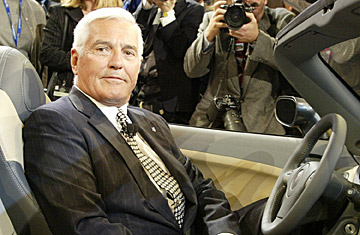
Former vice chairman of the Chrysler Corporation, Bob Lutz
(6 of 11)
DARLA MOORE: But then you've got— as the economy in the U.S. develops and we go through the Depression and then we go to World War II, the whole population of the U.S. fell out of the stock market after the crash.
And there was not a person— they wanted to be into purely safe things. Charlie Merrill in about 1940s— Everybody expected the country to go back into the pre-World-War-II Depression that we were in.
That was expected— anticipated to happen again. Well, it didn't happen. And it wasn't happening, and it wasn't happening. And Charlie Merrill saw this and said, "I want to create a people's capitalism — people. I want the guy that's got the $5,000 income, a mortgage, and a wife and two children. And I want him to begin to have confidence in the stock market, in the markets of the United States."
And he went out and created a whole different image for brokers. Prior to that, they were considered the lowest, most— they were the most accomplished crooks in the country— was a stock-broker.
WALTER ISAACSON: And a lot—
ROBERT A. LUTZ: Because of 1929.
DARLA MOORE: Yeah, because of 1929. Now, we may argue the same thing in 1999, but this was the argument that they were crooks, they were low-life, slick kind of people.
He changed the image of the stock broker and brought in somebody that looked good, dressed well, was well-spoken. I mean, this was just an image-building. You know, that "marketing." This was really marketing.
WALTER ISAACSON: And the last wave of— the most recent wave of raising capital somebody like Mike Milken. Is he a hero or a villain?
DARLA MOORE: But Charlie Merrill brought in the people.
WALTER ISAACSON: Right.
DARLA MOORE: Massive amounts of money.
WALTER ISAACSON: OK, well. We'll agree on him. Ray and Darla, tell me about—
RAY BRADY: Finance or—
WALTER ISAACSON: Yeah, on finance now.
DARLA MOORE: We've moved into capital.
WALTER ISAACSON: Mike Milken.
RAY BRADY: OK, because I was back Henry—
DARLA MOORE: It's the only thing I can talk about.
RAY BRADY: OK, fine.
WALTER ISAACSON: No, no, no. We've agreed on Henry Ford because—
RAY BRADY: You can't argue—
WALTER ISAACSON: —Bob told us to.
RAY BRADY: I don't think you can argue with J.P. Morgan. In fact, as I recall, wasn't there a crash or something where he helped bail the country out?
DARLA MOORE: That was the 19th century.
ROBERT A. LUTZ: 1907. He was—
RAY BRADY: 1907, yeah.
ROBERT A. LUTZ: He was the federal reserve of its day.
RAY BRADY: Yeah, exactly.
DARLA MOORE: Nineteen century.
RAY BRADY: Exactly. Yeah, exactly.
He came to the aid of the United States government and pretty much kept this country—
DARLA MOORE: Right.
RAY BRADY: —which is phenomenal, when you think about it. And so I would have to go along with J.P. Morgan for that. I would also go along with Charlie Merrill because those were days when nobody would go near the stock market.
I remember trying to get my father to buy a share of stock as late as the '50s, and he wouldn't touch anything.
DARLA MOORE: It was as big a decision to buy a share of stock as it was to buy a house.
RAY BRADY: Exactly, exactly.
WALTER ISAACSON: Geraldine.
GERALDINE LAYBOURNE: When you—
When you talk about J.P. Morgan, one of the first things that you think about is the legacy that he left behind in terms of public institutions — the Metropolitan Museum of Art wouldn't exist without him.
WALTER ISAACSON: Now, that's an interesting point.
GERALDINE LAYBOURNE: And, you know, when you're— when you're looking at whole century and you have the people at the beginning of the century who seem to be more into philanthropy than our current breed of titans.
I don't know whether it's fair to judge the current ones because they aren't in the later part of their career, where it seems that most— although I think J.P. Morgan was pretty much of philanthropist all the way through.
WALTER ISAACSON: So was Rockefeller.
GERALDINE LAYBOURNE: So was Rockefeller.
WALTER ISAACSON: His whole life.
So, you have Rockefeller, Carnegie and J.P. Morgan at the beginning of the century, and they invent not only finance, but they invent philanthropy.
GERALDINE LAYBOURNE: And you think about what's come out of that. I mean, you wouldn't have public television if it hadn't been for the Ford Foundation. Sloane-Kettering Memorial Hospital, you wouldn't— I mean, there's— It just goes—
The Carnegie Institute, you wouldn't have all of the grants to education that Carnegie has made possible.
ROBERT A. LUTZ: I was just going to make the snide comment that you're having an inordinate amount of difficulty getting anybody to talk about Mike Milken.
WALTER ISAACSON: Go ahead. Defend or attack Mike Milken.
ROBERT A. LUTZ: I'm not gonna touch it either.
WALTER ISAACSON: Oh.
All right. I throw out—
Go ahead.
DARLA MOORE: Wait.
